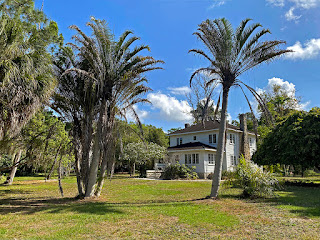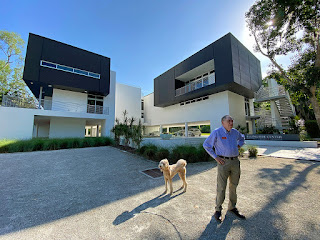Elling O. Eide; 1935-2012
Horticulturist, Asian scholar, Sinologist (Chinese Literary Studies), and founding member of the T'ang Studies Society.
(Indianola Park, FL. near the present day community of Vamo)
The original 100 acre property, the 'Indianola Park' sub-division, was purchased in 1935 by Elling Eide's maternal grandfather, Dr. Oliver Mitchell, Sr. Elling's father, Dr. Iver Eide (pronounced, Ide) and his mother, the former Grace Mitchell, moved their family onto the acquired property a year after, in 1936. Elling then, was just a year old.
Thirty two years later, the Eide family (mother and father) deeded the entire parcel, a natural preserve, to their only son, Elling. From 68' on, Elling Eide devoted the majority of his life to protecting and caring for this special piece of land.
The entrance drive of planted 'Long-leaf' pines on the original 100 acre Mitchell / Eide property.
The purchased Mitchell / Eide home (ca. 1895) was floated down to it's current site by barge, from Bradenton, FL in 1936.
In the early 1970's, Elling Eide planted over 450 different specimens of exotic palms and fruit trees throughout the property. A Cambodian, Asian palmyra palm below, remaining along today's bayside frontage.
By the 1990's, Elling Eide had become more obsessed with his on-going Asian research, and overwhelmed by his voluminous Chinese collection of rare literature and writings, allowed much of his earlier planting to go feral.
The bayfront property along Little Sarasota Bay, showing early planted Washingtonia palms rising above the mangrove shoreline.
Elling, as a youngster with his father, Dr. Iver Olaf Eide, along with one of many pets. (1945)
Over the years, Elling rode about on a white horse named Tom. And, during a particular period, over 50 peacocks roamed throughout the grounds. Often, many following Elling into the house, just to be fed. Whether domesticated or wild, being a life-long bachelor, Elling Eide had an uncommon love for all animals.
(below) Elling, middle-aged, with a favorite pup - Jenny. To name a few others; there was Jungle Berry, River Lilly, Dixie, Rajah and Blackie. And there were cats, one notably named 'Poussie Cat'.
A Southern Magnolia as a memorial tree was planted by Elling, where numerous pets were buried, and where Elling's ashes would later be distributed.
Elling Eide's early plan for the property, was to raise and propagate fruit trees under his own custom built greenhouse (1974). But after completing the structure, and overwhelmed by numerous distractions, those seedlings never saw the light of day.
To establish a foundation and research center was truly Eide's long-term goal - to hopefully one-day, house his extensive, personal collection of early Asian manuscripts and Chinese literature.
Elling Eide's cousin, Harold G. Mitchell (with pooch Ellie, below), president and founder of the
newly-built Elling Eide Center, shared with me while out-and-about on a recent walking tour - early
recollections of the man, the property and alarmingly, the massive amount of hoarded, recovered historic materials now housed in the current Center's archives.
Taken from a posthumus write-up in the New York Times, titled;
Amid the Spanish Moss of Florida, a Treasure Chest of Chinese Literature
Ian Johnson, April 8, 2017
"His research specialty had been China's most famous poet, Li Po, who lived during the Tang dynasty of the seventh to 10th centuries, often called China's greatest. That dynasty became his focus. He amassed 75,000 volumes, including 50,000 in Chinese: one of the largest private Chinese-language libraries in the world, and larger than many well-known universities' Chinese collections.
'The project reflected what friends and relatives call Mr. Eide's sometimes-manic personality. A onetime fitness buff with a dark brown beard, he became a paunchy recluse. He wore old clothes, chain-smoked Winstons and drove a beat-up Volkswagon bus. He poured his efforts into acquisitions but often neglected the details of cataloging and housing books."
A sampling below from the Elling Eide collection of rare Asian manuscripts and early Chinese literature. These and other academic materials are now archived in the newly completed library, within the on-site, contemporary Elling Eide Center.
The writings / a poem - from China's greatly admired Li Po, (701-762 AD) T’ang Dynasty.


























